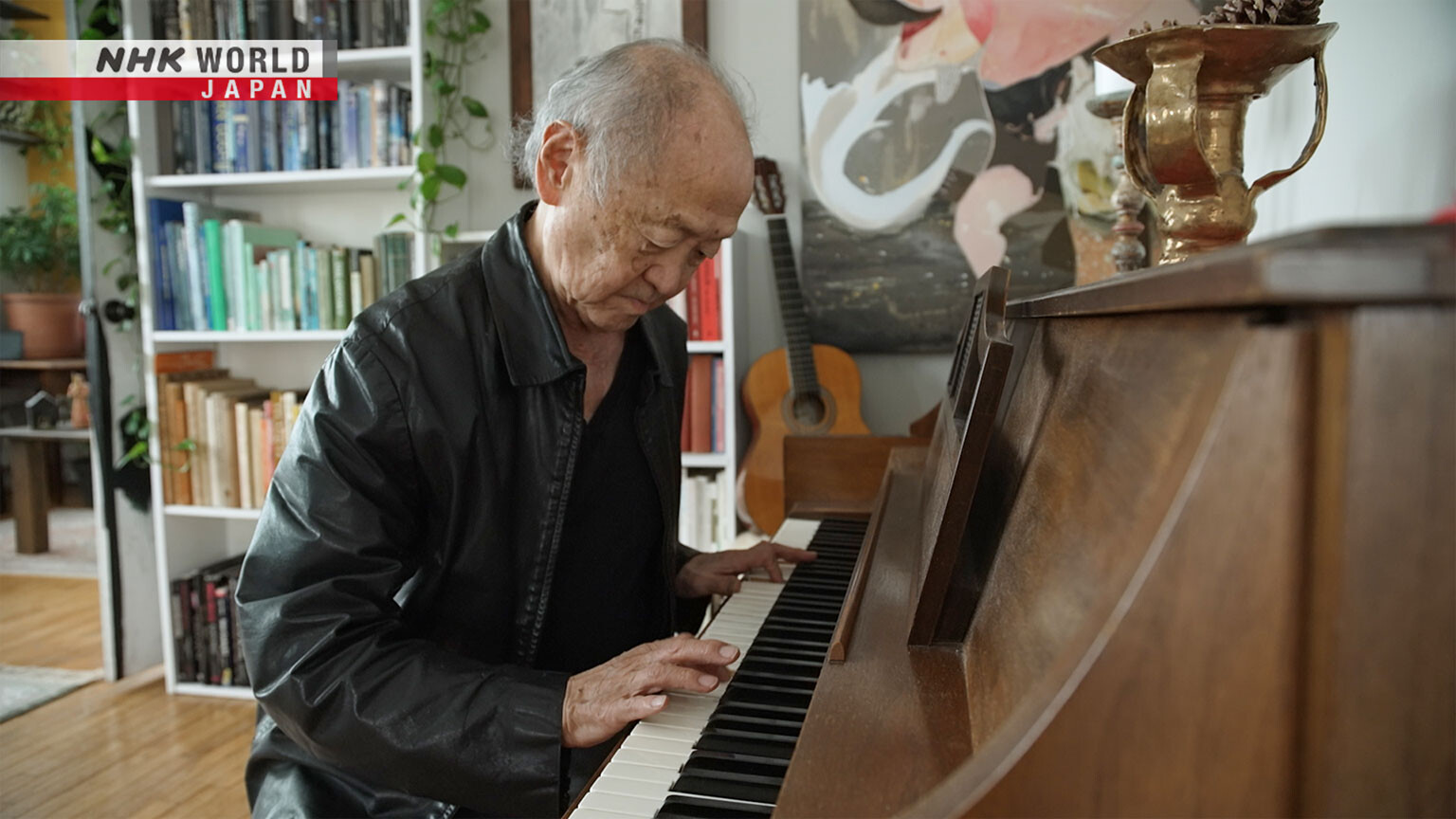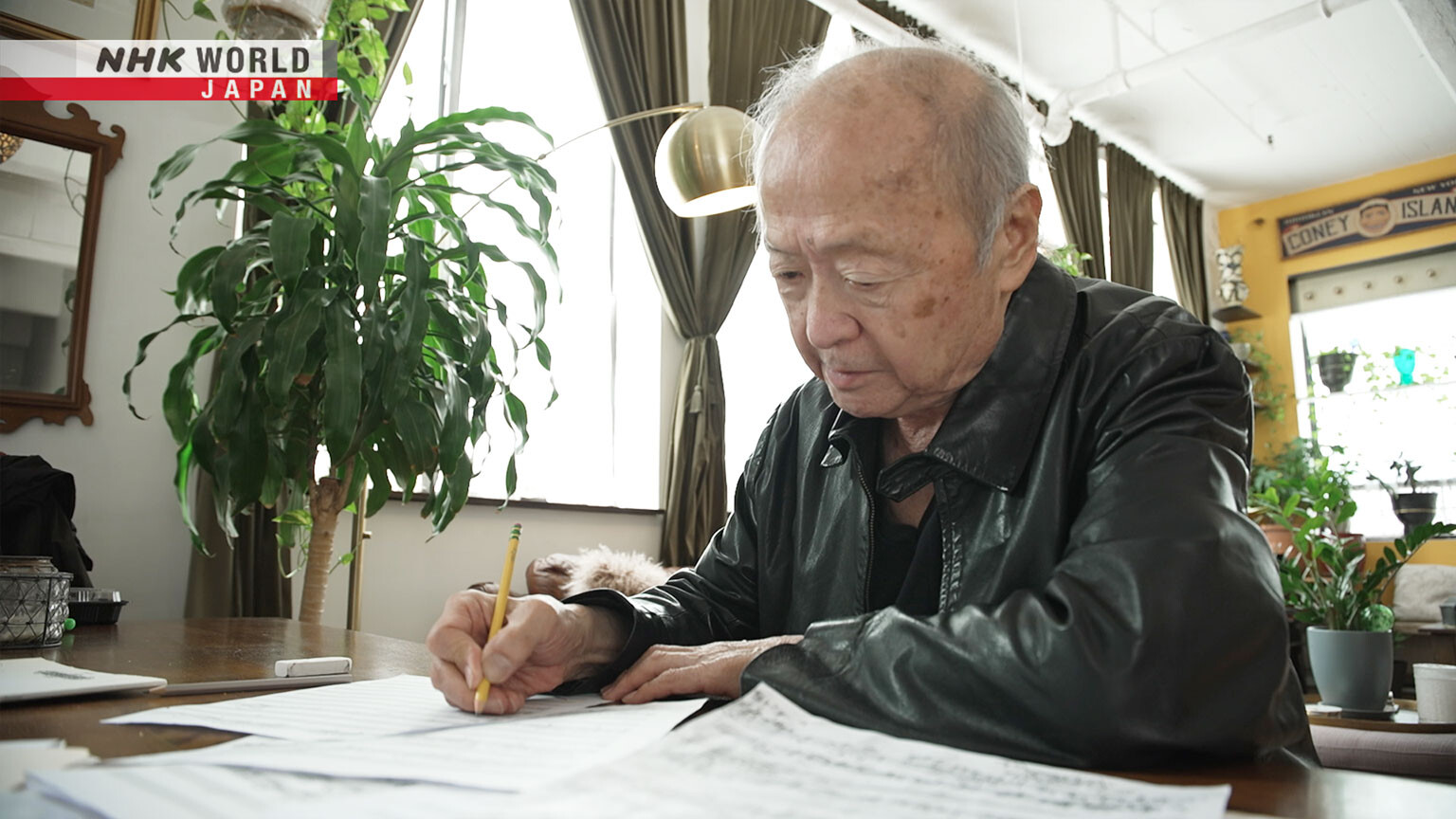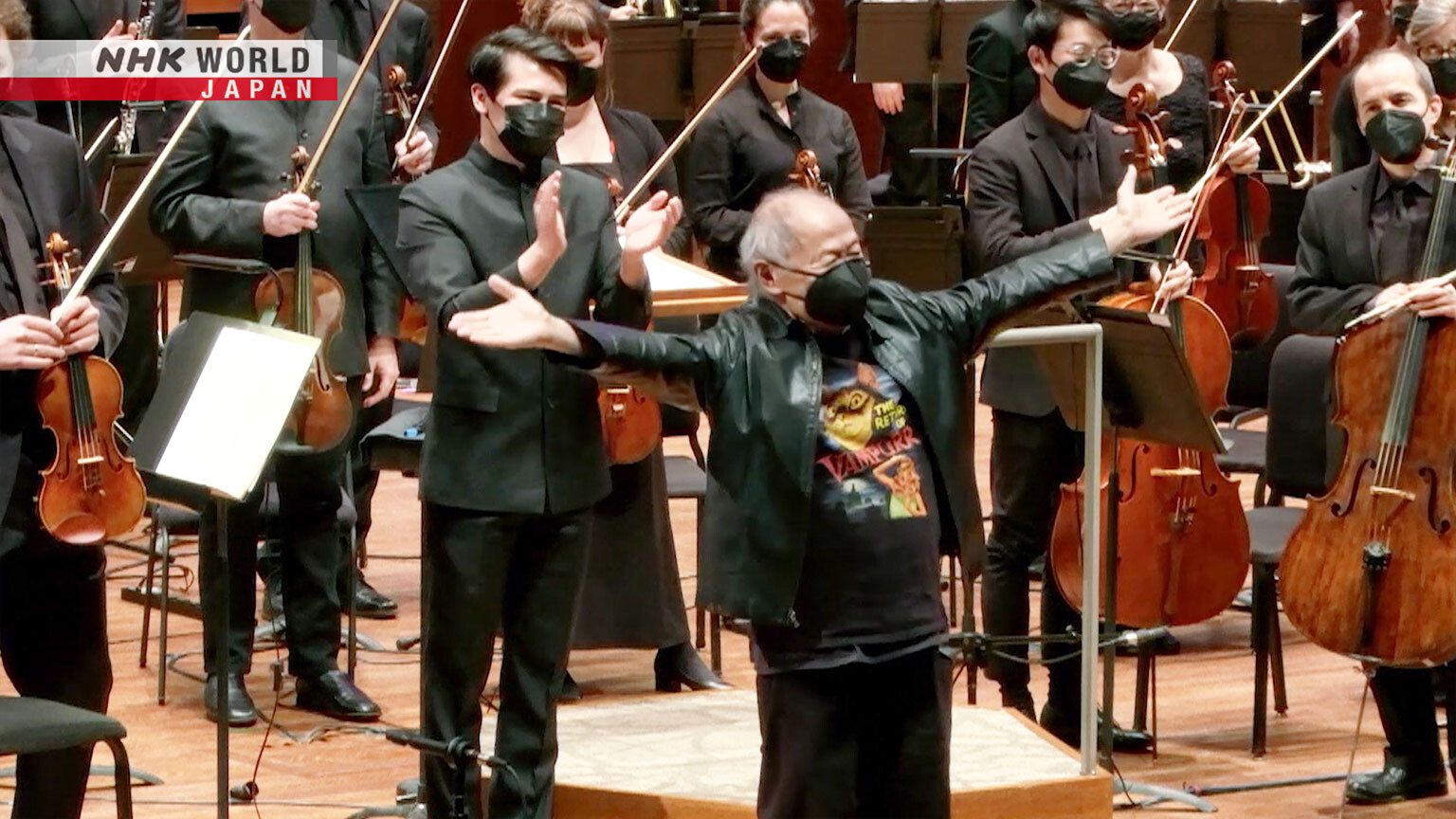War and the Power of Music: Paul Chihara / Composer
Composer Paul Chihara was inspired by music he heard at the Japanese American internment camp where he spent his childhood during WWII. How did the war affect him, and what does music mean to him?



Transcript
Direct Talk
January 2022, Seattle, USA.
To mark the 80th anniversary of the issue of
the United States presidential executive order
to relocate and incarcerate
Japanese and Japanese Americans
who were deemed enemy aliens
during World War 2,
a commemorative concert was held in Seattle,
where many people of
Japanese descent lived at that time.
One highlight was the piece titled
"Beyond the Hills,"
written especially for this concert.
The music was composed by Paul Chihara,
a Japanese American from Seattle.
During the war, Chihara was forced to live
with his Japanese parents and siblings
in an internment camp for
Americans of Japanese descent.
To my generation, the Senso was everything.
It really marked us as a generation
that was different from other Americans.
So that's what makes music for me
so important. It is personal. It's who I am.
Chihara says his musical career grew
out of the music he heard at the camp.
From his perspective as a Japanese American,
he's been deeply involved with music
in the USA for 80 years.
Paul Chihara tells us
about the power of music.
Seattle, USA
Here was my home.
Inside were my father and mother,
our family jewelry that we were selling.
The youngest of four children of
Japanese parents, Paul Chihara was born in 1938.
War between Japan and the United States
broke out when he was four years old.
The war between their two home countries
greatly changed the lives
of the Chihara family.
Chihara's father, a leader
in the Japanese community, was arrested.
Soon after, the rest of the family were sent
to a Japanese American internment camp
in a remote part of Idaho.
They were held there for about four years.
You know what I remember most about
when I think about the war,
we did not have my father.
The FBI came on the evening
of December 7th,
on the evening of Pearl Harbor.
They knew exactly where my father lived.
He was a successful businessman.
The government came and arrested him.
And we didn't know
where he was going or for how long.
You know, when you're in
a relocation camp and you're young,
a war is like a big baseball game
that's going on forever.
A lot of the time in the relocation camp,
I was by myself
or I was with my mother.
But then she was always
talking to her friends.
They mostly spoke about what was happening
to their families in Japan.
Isn't that interesting?
We were in America,
but we realized after a little while
that Japan was losing, and pretty soon
they realized Japan was losing badly.
And so it was always a very sad thing.
They wanted to know
what was happening to their families,
but they kept hearing about
people who were being killed.
During those four years,
I remember everything.
I remember most of all the music.
There was no television, of course.
In those days,
everybody listened to the radio.
Even as a child, God gave me the gift of
a very good ear and a good musical memory.
So I remember songs like
I used to sing as a boy
for there every Saturday we had
we called it a canteen.
We borrowed the word
from American war movies.
And I would sing.
I would sing,
Shina no yoru.
Shina no yoru.
I can sing more, but I won't.
But I also could sing like this.
My mama done told me
when I was in knee pants.
My mama done told me son,
and I was in knee pants by the way,
short pants.
We performed for each other.
There was no such thing as stage fright.
I was always in front of an extended family
and I was always performing
and I adored getting applause.
During his life at the camp, it was music
that gave hope to the young Chihara.
When the war ended,
he and his family returned to Seattle
and began to rebuild their lives.
His love of music was deepened
by his encounter with a violin.
So my father was released
just before the end of the war
from his, he was in a prisoner of
war camp, not in a relocation camp:
that is to say, he was in a camp
with other prisoners of war
from the Imperial Army or the Imperial Navy.
He was beaten up
by the military and I could see
it took him a while
to come back to being normal.
When I finally came back to Seattle
and I would go to school.
I was very young and my parents
were working all the time.
But the first time I saw a violin
was in my father's store.
He bought one secondhand
like the one on the wall
but I fell in love with it.
I said, I want to play that.
The first time I drew
my bow over the string,
it was like,
I don't want to use the word orgasm.
I was only 13 years old after all,
but it was like an experience
that I never had before.
So music has always been
something very tactile, physical for me,
and the music that I write
and the music that I love
is music that is emotional
and that moves me physically.
The young Chihara became so absorbed in
the violin that he joined a youth orchestra
and began his musical career,
including TV appearances.
Then the Korean War broke out.
Chihara, who had previously been labeled
as an enemy alien in the U.S.,
was now asked to perform at a concert
to entertain soldiers as a fellow American.
I had an older sister.
She and I became a piano and violin team:
Cathy and Paul Chihara.
We performed for, this is very ironic.
We were asked to join
a USO entertainment troupe
right after we were released,
and so we entertained soldiers,
American soldiers and seamen
during the Korean War.
The Korean War began in 1950.
We were released from
the relocation camp in 1945.
Now, five years may seem like
a long time to a child,
but it seemed like that all of a sudden
we were fighting another war in the Far East
against people that people
thought looked like us.
But it was very interesting suddenly
to be the good Asians, not the bad Asians.
We were the allies now.
And when we went and performed
because in our little USO troupe,
there were girls also, not Japanese girls,
the prettiest white girls you ever saw
when they came on stage,
and audience which were
not an audience at all.
They were soldiers who were GIs.
They just about died.
I'll never forget how important
music was to them.
I remember the music of that period,
and they were all the songs of that period,
I think was the greatest music
that the Americans have ever produced,
whether classical or popular.
And they had the greatest melodies
and the most interesting harmonies
that I've ever heard.
And that has really shaped
my musical conscience.
And for me to be a
performing musician, it was natural.
I was going to be a musician.
I never thought I'd make a living doing it,
and it never occurred to me
that I would become a composer.
Determined to pursue a career in music,
Chihara earned a doctorate in musicology.
He then went on to study music
in Paris and Berlin.
After returning home,
he was commissioned by world-class orchestras
—including the Boston Symphony Orchestra
and the London Symphony Orchestra—
to compose original music.
Then, while teaching at
a university in California,
an unexpected job opportunity
came his way from Hollywood.
Writing for Hollywood is a kind of thrill.
And how did I get into it?
A good example. I didn't pursue it.
I did not study how to write film music
in college or in music school.
I went to a conservatory.
I was called.
Professor Chihara,
please take this phone call.
And I was speaking with someone who said,
well, my name is Roger Corman,
and we're looking for a composer,
a student composer.
He wanted to save money.
He said, we understand you teach
electronic music at UCLA.
I said, yes, I do.
He said, well, I'm doing a movie.
It was a movie called
"Death Race 2000," by the way,
which has become a kind of cult favorite.
And I said, well, I have a very good student.
I'll send them to you.
I ran downstairs to my car and drove up
Sunset Boulevard to his studio.
And I met the great man, Roger Corman.
It was like meeting Walt Disney.
I think he was a wise man.
I think he saw immediately that
I was not a student. I looked very young.
But I think it's something
about my manner that told him
he's up to something and he told me
the script, and I said, I can do it.
And he gave me a check for $1,000.
Oh my God, I'm already in Hollywood!
This experience raised
Chihara's profile as a composer.
He now expanded his work into various genres,
and created a wide variety of compositions,
including scores for movies,
television, and Broadway musicals.
Then, after the age of 80,
and having lived through several wars
as an American of Asian descent,
an opportunity came to Chihara.
It was to compose a piece
to commemorate the 25th anniversary
of the normalization of diplomatic relations
between the USA and Vietnam.
He spent about two years
composing a concerto.
In March 2024, it was performed
in Massachusetts.
It's hard for me to listen to
my own music. It's agony.
I just, I get nervous
when I listen to my own music.
Chihara says a strong message of peace
runs through the composition.
As if a projection of
his own war experiences,
the piece depicts a young girl
involved in the Vietnam War
who overcomes despair and hatred,
survives strongly, and once again
finds peace in her life.
Because of my childhood experiences
during the Second World War,
when I wanted to be loved,
was hated only because I was Japanese.
Growing up, I realized
it was not necessarily hatred,
it was just society dealing with
the stress of war.
Maybe some of these people
had sons or brothers
serving in the Far East or in Germany.
War always brings out
the best and worst in people.
So I had a strange opinion of what it was
for me to be Japanese-American.
I don't feel that way anymore.
And music has liberated me from
being too concerned about mankind.
It's a very, very personal concerto for me.
Because it was inspired by Vietnamese music
and it was inspired by
the story of the Vietnam War
and the composer's experience
by the music for the war,
and also, I love the fact
that it's about the war
but it's about reconciliation
and hope and peace.
I feel very, like, inspired.
It showed, like, a lot of her-
I know the background of it was like,
during her life in Vietnam and then,
with the war and everything going on,
it brought me through the time of peace and
turmoil and back to peace again at the end.
So that was very inspiring me.
Now, 80 years after Chihara first fell in love
with music in an internment camp,
he is still actively making music.
So what does music mean to him?
We asked him for his motto.
Music is life!
One of my favorite composers,
Johannes Brahms, had a motto his whole life:
Frei Aber Froh, FAF.
It means "Free, but happy,"
and mine is "Music is life!"
I want to write a piece
that sounds very, very simple
and genuine, like one from the heart.
That was a saying that Francis Ford Coppola,
the great director with whom I worked,
he was writing a movie called
One from the Heart, as I recall.
I always thought that was such a good thing.
I wanted to write something
that I know comes from here,
and I think I'm doing it.